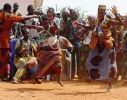Damaso
JF-Expert Member
- Jul 18, 2018
- 1,680
- 2,232
The rich tapestry of African values – ubuntu (humanity), respect for elders, and communal responsibility – forms the cornerstone of Tanzanian society. Yet, in a world increasingly influenced by globalization, the question arises: how effectively are these values being transmitted to the next generation? This articles argues that Tanzania can cultivate a vibrant culture of African values in its children through a multi-pronged approach that integrates these values into the formal education system, leverages the power of storytelling and community engagement, and fosters a sense of cultural pride.
Photo courtesy of Premium Times Nigeria.
The rapid pace of modernization presents challenges in transmitting African values to younger generations. Children are exposed to diverse cultural influences through media and technology, creating a potential disconnect from traditional ways of life. The formal education system, often modeled after Western systems, may not explicitly focus on instilling African values. Additionally, the breakdown of extended family structures, a cornerstone of communal responsibility, weakens the traditional support network for value transmission.
Imagine Aisha, a bright young girl in Dar es Salaam, excelling in her English lessons but struggling to explain the significance of greetings in her Swahili class. The focus on academic achievement can overshadow the importance of cultural understanding and the values embedded within them. This highlights the need for a more holistic approach to education that integrates African values into the curriculum. Aisha understands the names of all Monarchs in Great Britain Empire but she doesn’t know the names of her Grandmother, Great Grandmother, Great Great Grandmother.
Photo courtesy of Adobe Stock.
The formal education system can play a crucial role in instilling African values in children. Textbooks and lessons can be redesigned to incorporate stories, proverbs, and historical accounts that exemplify concepts like respect for elders (heshima kwa wazee) and sharing (ushirikiano). Imagine history lessons that go beyond dates and battles to highlight the courage and leadership of African heroes like Mangi Meli, Mkwawa, Bibi Titi, fostering a sense of pride in Tanzania's heritage. Furthermore, integrating traditional music such as, Sindimba, Mdundiko, and dance, as well as art forms into the curriculum can create a more engaging learning experience while simultaneously connecting children to their cultural roots.
Storytelling has long been a central pillar of African culture, serving as a repository of wisdom and a tool for transmitting values across generations. Imagine evenings around the campfire in a rural village, where grandparents enthrall children with tales of brave warriors (shujaa) who embodied courage and selflessness, or wise elders (wazee) who taught the importance of community spirit (ujamaa). The Ministry of Education can encourage storytelling initiatives in schools and communities. Training teachers and elders as storytellers would ensure the preservation and transmission of these valuable narratives. Additionally, promoting children’s literature that reflects African values can create a lasting impact on young minds.
Storytelling has long been a central pillar of African culture, serving as a repository of wisdom and a tool for transmitting values across generations. Imagine evenings around the campfire in a rural village, where grandparents enthrall children with tales of brave warriors (shujaa) who embodied courage and selflessness, or wise elders (wazee) who taught the importance of community spirit (ujamaa). The Ministry of Education can encourage storytelling initiatives in schools and communities. Training teachers and elders as storytellers would ensure the preservation and transmission of these valuable narratives. Additionally, promoting children’s literature that reflects African values can create a lasting impact on young minds.
Photo courtesy of Trailblazer Travelz.
The transfer of African values extends beyond the classroom walls. Communities play a vital role in nurturing these values in children. Traditional ceremonies and festivals can be opportunities to engage children in cultural practices that embody respect for elders (participating in greetings) and communal responsibility (contributing to preparations). Furthermore, intergenerational dialogue programs can connect children with elders who can share stories, proverbs (methali), and life lessons. These interactions not only bridge the generational gap but also create a sense of cultural continuity.
A vital step in cultivating African values is fostering a sense of cultural pride in children. Museums, cultural centers, and historical sites can be transformed into vibrant learning spaces. Interactive exhibits and educational programs can bring Tanzania's rich history and cultural heritage to life. Additionally, celebrating national holidays and cultural events can create a sense of shared identity and appreciation for African traditions. Imagine children participating in vibrant ngoma (drum) performances during celebrations, their faces beaming with pride in their cultural heritage. By fostering a sense of cultural identity, Tanzania can motivate children to embrace and uphold African values.
A vital step in cultivating African values is fostering a sense of cultural pride in children. Museums, cultural centers, and historical sites can be transformed into vibrant learning spaces. Interactive exhibits and educational programs can bring Tanzania's rich history and cultural heritage to life. Additionally, celebrating national holidays and cultural events can create a sense of shared identity and appreciation for African traditions. Imagine children participating in vibrant ngoma (drum) performances during celebrations, their faces beaming with pride in their cultural heritage. By fostering a sense of cultural identity, Tanzania can motivate children to embrace and uphold African values.
Photo courtesy of Tuka-Tuka.
The transmission of African values to the next generation is not the sole responsibility of any one institution. It requires a collaborative effort between the government, educators, families, and communities. By integrating African values into the formal education system, harnessing the power of storytelling and community engagement, and fostering a sense of cultural pride, Tanzania can ensure that these values continue to thrive in the hearts and minds of its children. As Aisha grows up, she will not only excel in academics but also understand the importance of respecting elders, sharing with her community, and taking pride in her rich Tanzanian heritage. By nurturing these values, Tanzania can empower its children to become responsible citizens who contribute to a vibrant and prosperous future.
